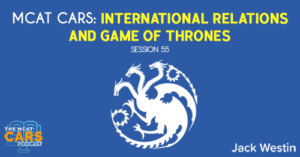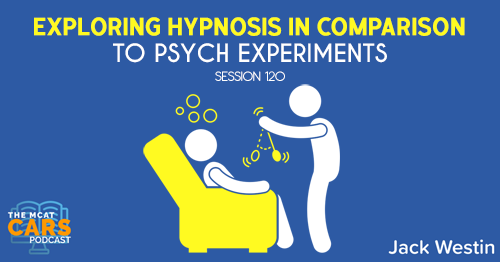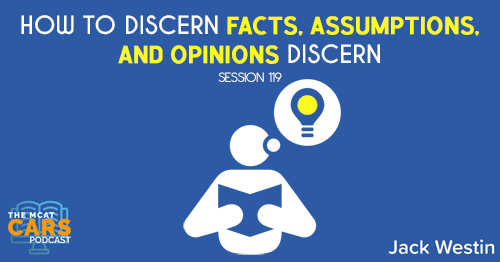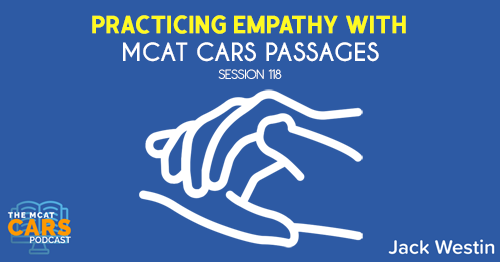Apple Podcasts | Google Podcasts

Session 55
This passage draws connections between European history and Westeros. Not a Game of Thrones fan? Remember: don’t spend too much time on any one paragraph!
We’re joined by Jack Westin. If you’re looking for some more MCAT CARS help, check out their free daily CARS passages.
Listen to this podcast episode with the player above, or keep reading for the highlights and takeaway points.
Link to article:
https://foreignpolicy.com/2019/05/23/ir-theory-and-game-of-thrones-are-both-fantasies/
Since the start of the series, Game of Thrones has been catnip for scholars of world politics and foreign policy.
They eagerly applied their talents and theories to ranking each character’s chances of winning the throne—repeatedly. There are scholarly journal articles about how to use a simulation based on the show to teach international relations theory. Rand Corp. has compared the show’s dragons to nuclear weapons. A Foreign Affairs article argued that, despite its use of violence, the show was no realist text but “a critique of the myopic focus on national security over the needs of individuals and the collective good.” (The author cited as evidence Daenerys Targaryen’s concern for civilians, a point that didn’t fare so well.)
There’s a good reason for this. It would be hard to imagine a fantasy world better concocted to appeal to international relations scholars than that of Westeros, the setting of Game of Thrones. After all, in many ways, international relations theory and Westeros are cousins since they descend from the same source material: bad European history.
That, perhaps, explains how seriously and earnestly many scholars, and journalists on the academic beat, have approached the show. It’s ironic that many international relations scholars see the show as realistic. Although medievalists welcome the surge of interest the show has produced in their work (and courses), they also worry about the distorting effects the show has had on how people perceive the medieval world.
Medieval historians argue that its depiction of medieval life is anything but realistic (and that’s before the dragons or ice zombies). Bluntly, life was slower, more religious, more racially diverse, and probably more concerned with taxation than the show was. Indeed, one scholar points out that, if anything, Game of Thrones is more a romance of the early modern European age (think the Thirty Years’ War or the conquest of the Americas) than of the medieval period.
This offers a hint about why international relations scholars find the show so compelling. If I can speak against my tribe, on the whole we are pretty bad at doing history for the same reasons that we are better at doing theory than are historians. When a political scientist approaches a case, he or she is usually more interested in seeing how the unfolding of events reflected some underlying theoretical trend than in getting the facts right.
[03:40] Paragraph 1, Sentence
Since the start of the series, Game of Thrones has been catnip for scholars of world politics and foreign policy.
Jack says:
Catnip is a good thing and you could guess it’s something desired by cats. But if you don’t know that, that’s okay. Keep reading. At least, you know we’re talking about a show called Game of Thrones. And that we’re talking about world politics and foreign policy.
[05:30] Paragraph 2, Sentence 1
They eagerly applied their talents and theories to ranking each character’s chances of winning the throne—repeatedly.
Jack says:
“They” refers to the scholars of world politics and foreign policy. They’re applying their talents and theories to the characters of the Game of Thrones, where the goal is to win the throne.
[07:03] Paragraph 2, Sentence 2
There are scholarly journal articles about how to use a simulation based on the show to teach international relations theory.
Jack says:
The show is a big hit in the academic world. There’s a journal article about the show and how to use it.
[07:22] Paragraph 2, Sentence 3
Rand Corp. has compared the show’s dragons to nuclear weapons.
Jack says:
Randcorp is a company and it’s comparing dragons to nuclear weapons. There’s some kind of correlation with the show.
[08:03] Paragraph 2, Sentence 4
A Foreign Affairs article argued that, despite its use of violence, the show was no realist text but “a critique of the myopic focus on national security over the needs of individuals and the collective good.”
Jack says:
It’s telling us about the show focusing on national security over the needs of the individuals and the collective good. It’s showing you how they’re relating the two – the show and its importance to foreign affairs.
[08:53] Paragraph 2, Sentence 5
(The author cited as evidence Daenerys Targaryen’s concern for civilians, a point that didn’t fare so well.)
Jack says:
The point you have to know is there is a relationship between Game of Thrones and foreign affairs. That’s a key. They’re quoting an article in the previous sentence. They’re literally using the show to understand national security.
In the quote, it says the author cited as evidence that Daenerys’ concern for civilians. It’s a character on the show.
The big picture of this paragraph is how Game of Thrones is used to compare and talk about world politics and foreign policy. You should not bring in your bias or opinion onto this. You may hate the show but it doesn’t matter.
'Whether you're a fan of the show or not should not affect your understanding of the author's position.'Click To Tweet[12:09] Paragraph 3, Sentences 1-2
There’s a good reason for this. It would be hard to imagine a fantasy world better concocted to appeal to international relations scholars than that of Westeros, the setting of Game of Thrones.
Jack says:
It’s establishing the place and it’s subjecting the show to real life.
[12:55] Paragraph 3, Sentence 3
After all, in many ways, international relations theory and Westeros are cousins since they descend from the same source material: bad European history.
Jack says:
This is becoming more confusing. But they’re saying the international relations theory and Game of Thrones are both from European history. So that’s the key. They stem from the same background which is bad European history.
[14:36] Paragraph 4, Sentence 1
That, perhaps, explains how seriously and earnestly many scholars, and journalists on the academic beat, have approached the show.
Jack says:
The author is saying that’s how the show is being written.
[15:05] Paragraph 4, Sentence 2
It’s ironic that many international relations scholars see the show as realistic.
Jack says:
Ironic means believing in something that you countered earlier. Or it’s doing something that’s opposite of what you would expect.
By saying something about internal relations scholars seeing it as realistic, maybe something they did or said would mean that they shouldn’t be realistic. So it’s ironic because it’s unexpected that you see these people believing that Game of Thrones is realistic.
The key here is to realize the hypocritical element going on. There’s is some kind of craziness going on.
[16:55] Paragraph 4, Sentence 3
Although medievalists welcome the surge of interest the show has produced in their work (and courses), they also worry about the distorting effects the show has had on how people perceive the medieval world.
Jack says:
Maybe the show is not as realistic as what the medieval world is like. The author probably doesn’t believe it’s real because it also says there’s irony there. The show is based on Medieval times. They don’t even believe that there are realistic elements in the show.
Notice, too, how the author mentions “distorting effects” which suggests it’s something bad. It’s distorting reality. You have to be sharp enough in catching the author’s position. And sometimes that position could be in the middle. So you have to be careful.
'The difference between a 129 and a 124 is how sharp are you in catching the author's position.'Click To Tweet[18:39] Paragraph 5, Sentence 1
Medieval historians argue that its depiction of medieval life is anything but realistic (and that’s before the dragons or ice zombies).
Jack says:
The Medieval historians are saying this is not real. It’s countering the previous paragraph where the international relations scholars see it as real.
[19:03] Paragraph 5, Sentence 2
Bluntly, life was slower, more religious, more racially diverse, and probably more concerned with taxation than the show was.
Jack says:
The Medieval historians are painting a different picture of what Medieval times would have been like. You have to go with the idea that this is what the author believes.
This is someone else’s point of view, but the author is further supporting it. They’re making a claim that they agree with because they’re bringing it up again. It’s a point you need to know. Because they state it, you have to believe that.
[20:35] Paragraph 5, Sentence 3
Indeed, one scholar points out that, if anything, Game of Thrones is more a romance of the early modern European age (think the Thirty Years’ War or the conquest of the Americas) than of the medieval period.
Jack says:
One is saying that the Game of Thrones isn’t a Medieval piece actually and it belongs to another age.
This is someone else’s point of view but because the author is presenting it in such detail, it is also the author’s point of view. Why else would the author bring this up this much?
Sometimes, the author may bring up the contrasting opinion or something that counters this. But ultimately, what the author cares about will be more direct, more supported, and more discussed.
[21:43] Paragraph 6, Sentence 1
This offers a hint about why international relations scholars find the show so compelling.
Jack says:
The author goes back to the original group of people he/she was talking about.
[21:57] Paragraph 6, Sentence 2
If I can speak against my tribe, on the whole we are pretty bad at doing history for the same reasons that we are better at doing theory than are historians.
Jack says:
The author is going to talk badly about the people he associates with. So the author is probably an international relations scholar because it’s talking about them right beforehand.
The point of the sentence is that they’re bad at doing history.
[23:16] Paragraph 6, Sentence 3
When a political scientist approaches a case, he or she is usually more interested in seeing how the unfolding of events reflected some underlying theoretical trend than in getting the facts right.
Jack says:
When they’re looking at something, they’re trying to fit something into a certain theory than just looking for what actually happened.
“The key to doing this understanding the structure of the passage. Know where it starts, where it heads into the middle, and then where it ends.”Click To TweetIt starts off with the idea that international relations people like Game of Thrones. It connects international relations and Game of Thrones saying they both have bad history. But we don’t really know what bad history means.
Right after that, the author starts describing how Game of Thrones has no real historical value. It doesn’t maintain the actual historical theme of the time. It’s bad history because it doesn’t really represent history well.
And in the end, the author says that Game of Thrones isn’t the only one that has bad history. The international relations scholars also have bad history. So they really like it because they’re so focused on theory but they’re not really focused on history. And maybe, it’s not that great an example of an international theory because it doesn’t have that historical context that it should have. Hence, they like Game of Thrones because they’re both bad historians.
Links:
Link to article:
https://foreignpolicy.com/2019/05/23/ir-theory-and-game-of-thrones-are-both-fantasies
SEARCH SITE
SEARCH SITE
LISTEN FOR FREE











